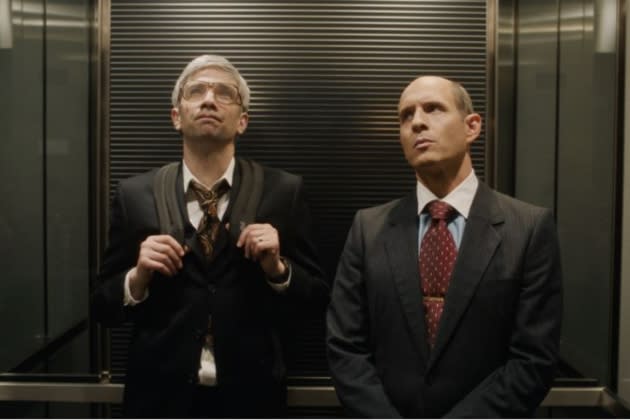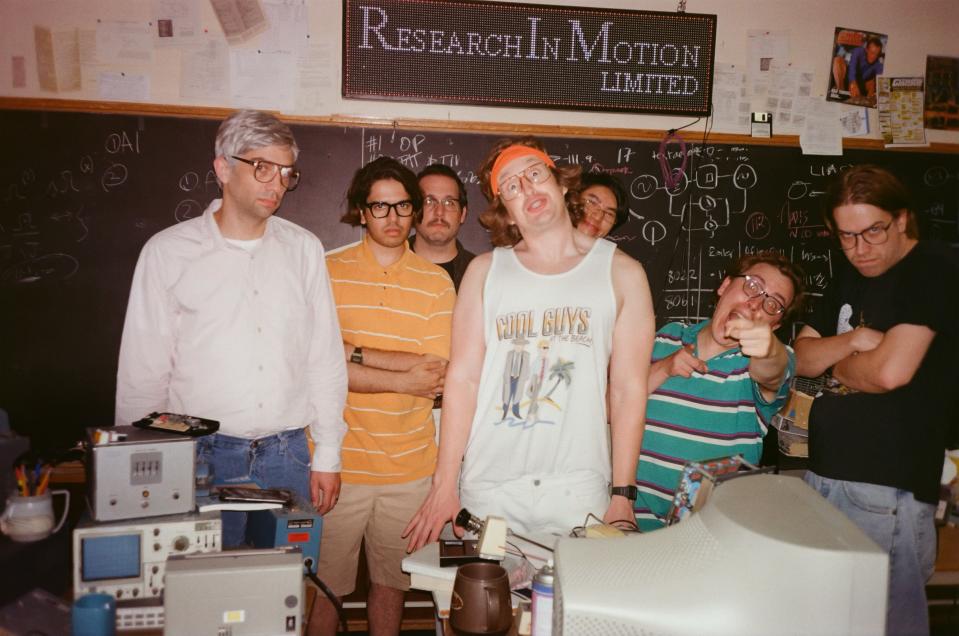‘BlackBerry’: A Superhero Origin Story for the Great O.G. Smartphone
- Oops!Something went wrong.Please try again later.
- Oops!Something went wrong.Please try again later.

Never, ever underestimate the power of a glowering, growling Glenn Howerton.
It’s not like the It’s Always Sunny in Philadelphia co-creator hasn’t previously played someone who acts horrifically yet still keeps you on his side. (See: Every single episode of It’s Always Sunny in Philadelphia Howerton is in.) Nor is it off-brand for the writer-actor-producer to take on a role in which he radiates that he’s better than the idiots and saps and suckers surrounding him, as fans of the late, great sitcom A.P. Bio can attest. But Howerton brings something to BlackBerry, the scrappy Canadian indie about a scrappy Canadian company that changed the world, that goes above and beyond his usual lovable sociopath act. It’s not range. It’s rage. Pure, 100-percent uncut short-fuse anger. Beautiful, sputtering, spittle-flying fury.
More from Rolling Stone
Don’t let the bald-pated look distract you: Howerton may have shaved his head to look more like Jim Balsillie, the business executive who helped turn the idea for an all-in-one mobile device into a reality, and then the first shot fired in a revolution. But the real difference between this gent and the other morally dodgy guys filling his IMDb page is how Howerton is tapping into a specific white-collar volatility — that kind that drives a specific type of M.B.A. ego to get things done and burn things down. The man is explosive even when he’s silently standing still. That the actor is providing this tech-product biopic with a center of gravity is almost by default, given how the film is a lot like its other two main characters: jittery, thirsty, somehow both too unsure and too blustery in all the wrong places. Yet the performance isn’t just propping everything up. It’s taking a film that’s all thumbs and providing a much-needed jolt via a well-placed middle finger.
About the less-than-dynamic duo that rounds out this unholy corporate trinity: They’re Mike Lazaridis (Jay Baruchel) and Douglas Fregin (cowriter-director Matt Johnson), longtime friends and co-founders of Research in Motion. A cybersecurity software company based in Waterloo, Ontario — feel free to savor the city’s name, given how this story ends; the film certainly does — R.I.M. is deeply in debt, and the office is little more than a beta-male frat house. But Lazaridis has been developing this idea for a phone that allows you to send and receive email, which is how they end up in Balsillie’s office, pitching the idea for their game-changing “PocketLink” device. He can’t take these guys seriously, yet this corporate shark can still smell the faint whiff of blood in the water in terms of the concept. And once he’s fired from his day job, Balsillie talks his way into becoming R.I.M.’s co-CEO, invades the nerds’ safe space, and starts screaming at folks to Get. This. Thing. Done. Yesterday.
Cue The Social Network-lite, featuring two dorks and an apex predator — as well as the rise and precipitous fall of an accidentally innovative communications company, the shattering of a BFF bond, the aftermath of an inevitable ideological sellout, and enough hubris to melt a million pairs of wax wings. We’re supposed to feel the emotional fallout of the rift between Lazaridis, “the dropout boy genius” still trying to make good on his promise, and Fregin, who’s supposed to be the company’s conscience against “the mark of the beast” (a.k.a. a “Made in China” stamp, synonymous with shoddy craftsmanship and an assembly-line mentality) yet simply lives for endless employee movie nights.
Yet only the Lazaridis side of the equation has any heft to it, with Baruchel letting every anxious social encounter and baby-step up the corporate ladder play out in a symphony of stammering responses. An early sequence, in which his tech savviness saves the day during one of Balsillie’s presentations, proves that the geek and the grandstanding salesman are the real match made in heaven. Johnson’s apoplectic second banana is just a third wheel, in more ways than one. Rarely has an orange headband had to do so much heavy lifting in terms of character.

Drawing from Jacquie McNish and Sean Silcoff’s book Losing the Signal: The Untold Story Behind the Extraordinary Rise and Spectacular Fall of BlackBerry, the movie covers the familiar ground of Big Tech’s late ‘90s/early ‘00s gold-rush mentality, as well as syncing up with a number of other recent films — notably Air and Tetris — that combine millennial nostalgia, niche markets that cause mainstream cultural upheavals, and revenge of the nerds. BlackBerry doesn’t add much to the discussion as to why such stories might be percolating into our collective consciousness, nor why such narratives might be taking on an extra layer of meaning right now; it feels content to fashion this unlikely ascension of the Great Canadian Smart Phone That Could as a superhero origin story yet doesn’t know what, if anything, it wants to say about this phenomenon past that. It’s one big distinguishing factor may end up being what can only be described as the single most random soundtrack in recent memory.
(Not to get too hung up on this, but: We get why someone would throw a handful of period-appropriate tunes over scenes, and adding the Kinks’ “Waterloo Sunset” is maybe too good an opportunity to pass up, what with the city’s name and all. But having a take-no-prisoners white-collar killer rocking Joy Division’s “Love Will Tear Us Apart” from his car speakers feels a little off. And dropping Slint’s “Good Morning Captain” [!] over a scene of driving through Manhattan, then acting as if it’s diegetic music coming out of an NYC cabbie’s radio [!!!], is just a bridge too far. These things matter.)
And still: There’s Howerton, his head gleaming like a bullet about to be fired into some unlucky soul’s heart, a beacon of desire for power and prestige and maybe the chance to own his own hockey team, burning through every scene like not only Balsillie’s livelihood but his life depended on it. There’s something so compelling about what he’s doing that he almost convinces you that BlackBerry is better than it is. And then you remember that it’s still a movie that treats “good enough” as the enemy of perfection and creativity, yet still feels it’s acceptable to be just good enough as a dramatization based on a true story. Irony — it’s a bitch.
Best of Rolling Stone

